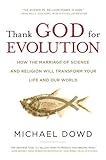 |
Thank God for Evolution: How the Marriage of Science and Religion Will Transform Your Life and Our World |
Dowd’s conclusions (insofar as they’re decipherable) seem consistent with a desire to retain the engine of religion–what could broadly be called the existential urge–without having to invoke the God of traditional theisms as the object of religious sentiment. Dowd’s god however is a personification of the universe as a whole and he views the universe as a living organism that is made conscious through the large mammalian brains of homo sapiens (as far as we can tell).
Unfortunately, Dowd does both religion and science a disservice. Religion without God is unintelligible and science characterized by excessive sentimentality is diluted. Dowd’s narrative ends up being far too thick on sentiment and much too thin on substance. Dowd doesn’t argue for his positions, he preaches them. As with any sermon, one either chooses to accept it or reject it. Anyone looking for a religious version of Dawkins’ The Greatest Show on Earth should look elsewhere (The classic The Varieties of Religious Experience by William James is a good alternate).
For those who have ears to hear, Dowd’s narrative is also quite condescending to positions he finds anachronistic and outdated. His message to the modernist laggards is clear: get up to speed or you will be culpable for the world’s problems. Dowd casts himself as a visionary who peers in the not-so-distant future and has a sort of friendly contempt for those who remain stuck on a pre-enlightened worldview (in both science and religion). Dowd attempts a rich stew made up of equal parts religion and science but ends up creating a thin, bland, lukewarm swill garnished with rose petals.








